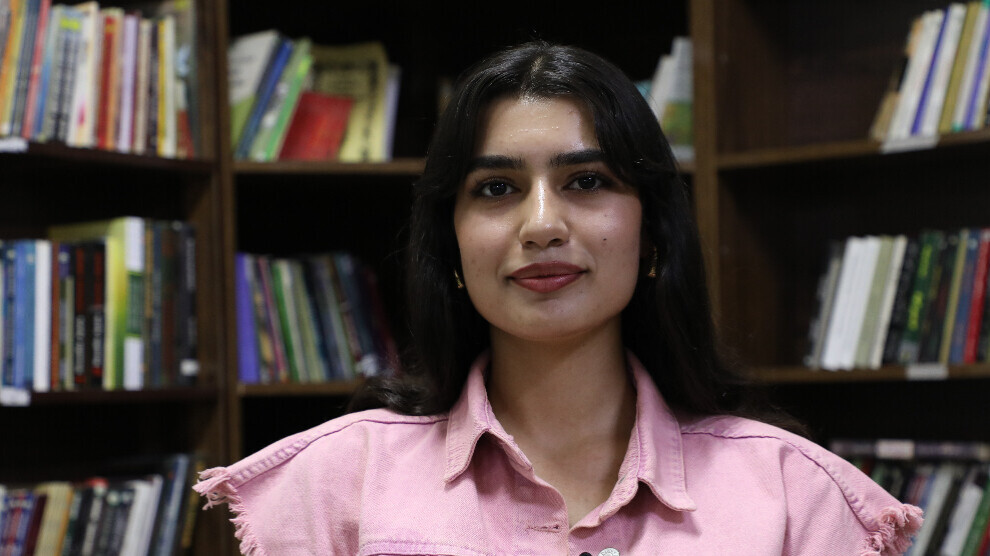Hêvî Mîrzo: I want to serve the revolution
Hêvî Mîrzo wants to study medicine at the University of Rojava to serve the people of Northern Syria and advance the revolution. "This revolution needs doctors," said the young Kurd from Serêkaniyê.
Hêvî Mîrzo wants to study medicine at the University of Rojava to serve the people of Northern Syria and advance the revolution. "This revolution needs doctors," said the young Kurd from Serêkaniyê.

Hêvî Mîrzo is a young woman from Serêkaniyê. When she was twelve years old, in 2019, the city in northern Syria where she was born and grew up was occupied by the Turkish state and its jihadist mercenaries. Hêvî fled with her family to Hesekê and finished school there. After passing the entrance exam for the University of Rojava with the best grades, she is now preparing for a six-year medical degree.
ANF spoke to Hêvî Mîrzo about the importance of an education in her mother tongue and about her plans for the future.
Talking about the Turkish invasion of the autonomous region of Northern and Eastern Syria, which in October 2019 occupied the area around Serêkaniyê and Girê Spî a year and a half after Afrin, Hêvî said: "We had a house and land in Serêkaniyê. It was a good life. We were liberated by the revolution. I went to school there until the ninth grade and had good relationships with my schoolmates. We were like relatives with our neighbors. After the invasion, everyone lost touch. I had to leave my friends, my school and my home.
When we came to Hesekê, I was like a stranger, I didn't know anyone and was in a state of shock. We moved several times and I had to change schools three times. Just when I thought I had adapted, I was back to square one: new school, new teachers, new friends, new house and new neighbors. I missed my life in Serêkaniyê, but despite the occupation, I never forgot that I had to complete my school education, and I fought to succeed."
I want to study and live in Kurdish
After the revolution of July 19, 2012, multilingual education was introduced in the autonomous region. Students can now learn in Kurdish or Aramaic for the first time, in addition to Arabic. Hêvî Mîrzo started school at that time. She said: "My school life began with the revolution, and I am a young woman who grew up with the revolution. I see it as a great chance and opportunity to learn freely in my mother tongue. My family and I spoke Kurdish at home. If I had to speak Kurdish at home and Arabic at school, how could I be successful? Can an Arab child be successful in a Kurdish school while speaking Arabic at home?
Thanks to the revolution in Rojava, I was lucky enough to be taught in my mother tongue. Many people said: 'You are intelligent and successful, why are you studying in Kurdish and not Arabic?' But I did not take this opinion into account and did not think it was right. As a young Kurd, I was convinced of the need to learn in my mother tongue and keep my language alive. That is why I fought hard for it. That is why I passed the university exam as the best and enrolled in the Faculty of Medicine at Rojava University. I want to study and live in Kurdish. And I am aware that I have to work even harder for the university. Our university was founded with the revolution and has taken important steps; we must make these steps even bigger."
The revolution needs doctors
Hêvî's father, Mihemed Salih Mîrzo, was killed in an Islamist attack on his car in 2014. He had a great influence on her career choice. Hêvî said: "My father really wanted me to become a doctor, and that's what he always said: you will study medicine, you will become a great doctor. On the day of his death, he bought me a health kit as a toy. I would have loved to see him live to see the day when I became a doctor. It was also my mother's wish. My mother Meha Hesen, the wife of a martyr, looked after her five children. She raised us for the revolution and followed in her husband's footsteps.
Studying medicine has always been my dream. I experienced the developments after the revolution first hand. In this context, I realized that I should study medicine. This revolution needs doctors. In order to serve and advance the revolution and the people of my country, I will complete my medical studies at the University of Rojava and follow in the footsteps of my fallen father."